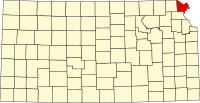Doniphan County
| Doniphan County, Kansas | |
|---|---|
| County | |

|
|
 Location in the U.S. state of Kansas |
|
 Kansas's location in the U.S. |
|
| Coordinates: 39°48′N 95°07′W / 39.800°N 95.117°W | |
| Founded | August 25, 1855 |
| Named for | Alexander William Doniphan |
| Seat | Troy |
| Largest city | Wathena |
| Area | |
| • Total | 398 sq mi (1,031 km2) |
| • Land | 393 sq mi (1,018 km2) |
| • Water | 4.9 sq mi (13 km2), 1.2% |
| Population (est.) | |
| • (2016) | 7,664 |
| • Density | 20/sq mi (8/km²) |
| Area code(s) | 785 |
| Congressional district | 2nd |
| Time zone | Central: UTC-6/-5 |
| Website | DpCountyKS.com |
Doniphan County (county code DP) is a county located in the U.S. state of Kansas. As of the 2010 census, the county population was 7,945. Its county seat is Troy, and its most populous city is Wathena.
For many millennia, the Great Plains of North America was inhabited by nomadic Native Americans. From the 16th century to 18th century, the Kingdom of France claimed ownership of large parts of North America. In 1762, after the French and Indian War, France secretly ceded New France to Spain, per the Treaty of Fontainebleau.
In 1802, Spain returned most of the land to France, but keeping title to about 7,500 square miles. In 1803, most of the land for modern day Kansas was acquired by the United States from France as part of the 828,000 square mile Louisiana Purchase for 2.83 cents per acre.
In 1854, the Kansas Territory was organized, then in 1861 Kansas became the 34th U.S. state. Doniphan County was established on August 25, 1855, then organized on September 18, 1855. It is named for the U.S. cavalry commander Colonel Alexander W. Doniphan (1808–1887) of Liberty, Missouri, who played an important part in the Mexican-American War. He was a zealous partisan in the failed effort made to extend slavery into Kansas.
...
Wikipedia
